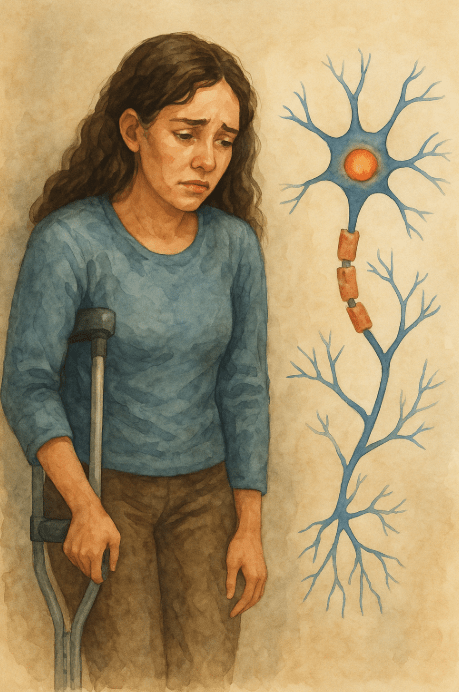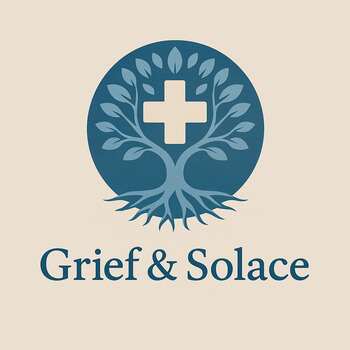Grieving Multiple Sclerosis: Mourning Strength in a Fading Body
Grief with multiple sclerosis is slow and merciless, watching someone lose ground a little at a time, even while their spirit tries to stay standing.

This post blends real grief with grounded knowledge. It isn’t clinical. It isn’t distant. It’s meant to sit beside you—not above you. The story you’ll read is meant to reflect what so many feel when living through or witnessing this condition: confusion, exhaustion, and quiet forms of courage.
If what you read feels familiar, please speak with your doctor. Your pain deserves more than silence.
I Watched Her Walk Away From Me One Step at a Time
At first, it was just a stumble…a minor trip on the curb outside the grocery store. She laughed it off, claiming the sidewalk was uneven. But after that, her hand lingered in mine a little longer than usual.
Next came the numbness. First, it was her fingers, then her legs…a persistent pins-and-needles sensation that wouldn’t fade, no matter how much she tried to shake it off. She said it felt as if her body began whispering in a language she couldn’t fully understand.
The MRI marked the beginning of our new reality. White spots…lesions, they called them. Multiple Sclerosis. Her immune system had turned traitor, attacking the nerves and eroding the connection between her body and brain.
🧠 Symptoms:
– Numbness or tingling
– Weakness (commonly in limbs)
– Vision loss (often one eye at a time), double vision, or blurry vision
– Electric shock sensations (Lhermitte sign)
– Coordination and balance issues
– Slurred speech
– Fatigue
– Dizziness or vertigo
– Memory problems and difficulty concentrating
– Mood changes, including depression or anxiety
– Trouble with bowel, bladder, or sexual function
– Symptoms may worsen with heat or fever (pseudo-relapse)
types:
– **Relapsing-remitting MS (RRMS)**: Most common type; periods of new or worsening symptoms followed by remission.
– **Secondary-progressive MS (SPMS)**: Gradual worsening after an initial relapsing course.
– **Primary-progressive MS (PPMS)**: Continuous worsening from onset without clear relapses.
– **Clinically isolated syndrome (CIS)**: First episode of neurologic symptoms, may or may not develop into MS.
– **Radiologically isolated syndrome (RIS)**: MS-like brain/spinal lesions without symptoms.
She nodded as the neurologist spoke, accepted the pamphlet, and scheduled the follow-up. But I could see the flicker in her eyes, the fleeting moment when you realize your life has quietly fractured.
Initially, there was hope. The relapsing-remitting kind. Periods of “normal” a time to pretend the diagnosis was tucked away in a drawer, not entwined with her spine. She took the injections, altered her diet, and began tracking everything—heat sensitivity, fatigue levels, and dizziness after showers.
But MS doesn’t follow a straight path. One day, she danced in the kitchen with a cup of coffee; the next, she struggled to feel her feet. And the cruelest part? She never looked sick.
People told her she was lucky. They’d say, “At least it’s not cancer,” or, “You’re young; you’ll bounce back.” They’d remark, “You don’t even seem disabled.” They didn’t see her on the bathroom floor, too fatigued to stand. They didn’t hear her whisper, “Fuck you,” to her own legs. They didn’t witness her breaking down after forgetting a word in the middle of a sentence…not a complicated word, just one she’d known her whole life.
Complications:
– Severe weakness or paralysis
– Muscle stiffness or spasms
– Seizures (rare)
– Cognitive decline
– Depression, anxiety, and mood instability
– Incontinence or constipation
– Sexual dysfunction
Causes:
– Unknown exact cause
– Autoimmune attack on myelin in the brain and spinal cord
– Likely triggered by a mix of genetics and environmental factors (e.g., Epstein-Barr virus)
Cognitive fog, they said. MS hug, they said. Clinical terms that sounded manageable. But they never mentioned the grief, the quiet, relentless sorrow of watching the person you love fade a little more each year while still being right there in front of you.
We began counting milestones in reverse. The last time she ran. The last time she carried groceries unassisted. The last time she climbed stairs without needing to pause.
I stood by her, trying to remain brave, but with every step she lost, it felt like one more step she was taking from us.
And yet, she still smiled. She still made jokes with her neurologist. She still wore eyeliner, even when her hands trembled. She still asked if I was doing okay.
Slowly, she walked away from me…not by choice, nor by will, but by the silent cruelty of a disease that doesn’t care how much you love someone.
And I love her…every version, every stumble, every flare, every inch she’s had to surrender. Because MS didn’t steal her spirit; it simply taught me to love louder, longer, and in ways I never thought I would need to.
She didn’t vanish…She just changed terrain… And I keep following, even if I have to carry her sometimes.
Risk Factors:
– Age (20–40 most common)
– Sex (2–3x more common in women)
– Family history
– Certain infections (notably Epstein-Barr)
– Race (more common in white populations, esp. Northern European ancestry)
– Climate (higher rates in temperate regions)
– Vitamin D deficiency and low sunlight exposure
– Obesity
– Smoking
– Autoimmune disorders (e.g., thyroid disease, psoriasis)
📘 Diagnosis & Treatment
diagnosis:
– MRI (brain and spinal lesions)
– Lumbar puncture (CSF testing for antibodies, kappa free light chains)
– Blood tests (rule out mimics)
– Evoked potentials (electrical nerve responses)
– Optical coherence tomography (retinal nerve thinning)
– Neuropsychological testing (memory, processing, attention)
treatment:
attack management:
– Corticosteroids (oral prednisone, IV methylprednisolone)
– Plasma exchange (plasmapheresis) for steroid-resistant attacks
disease modifying therapies (DMTs):
injectables:
– Interferon beta (flu-like side effects, liver monitoring)
– Glatiramer acetate (Copaxone)
– Ofatumumab (Kesimpta)
oral:
– Teriflunomide (Aubagio)
– Dimethyl fumarate (Tecfidera), Diroximel fumarate (Vumerity), Monomethyl fumarate (Bafiertam)
– Fingolimod (Gilenya), Siponimod (Mayzent), Ozanimod (Zeposia), Ponesimod (Ponvory)
– Cladribine (Mavenclad)
infusions:
– Ocrelizumab (Ocrevus) – also approved for PPMS
– Natalizumab (Tysabri) – risk of PML (brain infection)
– Alemtuzumab (Lemtrada) – reserved for aggressive MS
– Ublituximab (Briumvi)
symptom management:
– Muscle relaxants: Baclofen, Tizanidine, Botox
– Fatigue: Amantadine, Modafinil, Methylphenidate (effectiveness varies)
– Walking speed: Dalfampridine (Ampyra)
– Other meds: for depression, pain, sleep, bladder/bowel
rehab and lifestyle:
– Physical therapy (strength and gait)
– Occupational therapy (daily task adaptation)
– Assistive devices (walkers, braces)
– Exercise (low-impact aerobics, swimming, yoga)
– Cooling strategies (vests, cold packs)
– Mediterranean diet
– Vitamin D supplementation
– Stress reduction (meditation, massage, support groups)
alternative:
– Acupuncture, yoga, cannabis extract (oral form shown helpful for spasms)
– Stem cell therapy and BTK inhibitors under investigation
coping and support:
– Learn your subtype and treatment options
– Lean on family, friends, or support groups
– Work with mental health providers for mood symptoms
– Advocate for care and workplace accommodations
– Monitor emotional health along with physical progression
I know this is heavy, and I understand that the road ahead may feel like a tangle of loss and unanswered questions. But please hear this: you are not broken because you are hurting; you are not weak because you are afraid. You are living through something real, and survival itself is a kind of grace. You are allowed to struggle, you are allowed to hope, and you are allowed to not have all the answers today. Whatever comes next, you do not face it empty-handed; you carry every moment of love that shaped you, and that will always be enough to keep going.
🎀 Gifts to help With Multiple Sclerosis
🏥 Everyday Comforts for Everyday Battles
Managing Multiple Sclerosis often means needing a little extra help.
Sometimes it’s about restoring dignity, ease, or simply getting through the day with less pain.
These carefully chosen tools aren’t just items; they’re small bridges back to living.
This section is about finding practical support, never shame.
Foldable Shower Seat with Back Support – Stability for the Days When Standing Isn’t an Option
MS doesn’t ask for permission—it just takes. Some days, you can move fine. Other days, standing in the shower feels like climbing a mountain. This foldable shower seat offers reliable, non-slip support with a backrest and drainage design, giving people a safe place to rest while washing. Because independence shouldn’t vanish with strength.
🌿 Paths to Healing Beyond the Map
Sometimes traditional medicine isn’t enough.
If you’re exploring gentle, alternative options to help with Multiple Sclerosis,
you might find comfort in plant-based compounds like **CBD or CBG**.
*This section is not medical advice, just a door left open.*
USA Medical Total Support Pack – Steady Backup for a Nervous System That Won’t Stay Still
MS brings more than nerve damage—it hijacks sleep, mood, and physical energy. This Total Pack blends CBD, inflammation support, stress relief, and gentle immune balance to help the system calm itself. It won’t stop demyelination. But it may give your body room to rest between the battles.
Need a Different Path Forward?
Every journey through grief looks different. Choose the next step that speaks to where you are now:
When You're Ready to Start Healing
Healing doesn’t mean forgetting.
It means finding small ways to carry your grief with strength and grace.
These are the stories, tools, and gentle steps to begin walking forward…at your own pace.
When You're Still in the Thick of It
Sometimes healing feels like a lie.
If you’re not ready to move on…if the pain still roars louder than the world wants to hear…this is the place where you’re allowed to feel it.
No sugarcoating. No pretending. Just truth.
When You're Holding on to Who’s Still Here
Grief reminds us to love louder.
If someone you love is still with you, this is your place to celebrate them, honor them, and create new memories while there’s still time.
Joy and sorrow can live side by side.






